2024届高考英语二轮复习时态语态讲解课件(共94张PPT)
文档属性
| 名称 | 2024届高考英语二轮复习时态语态讲解课件(共94张PPT) | 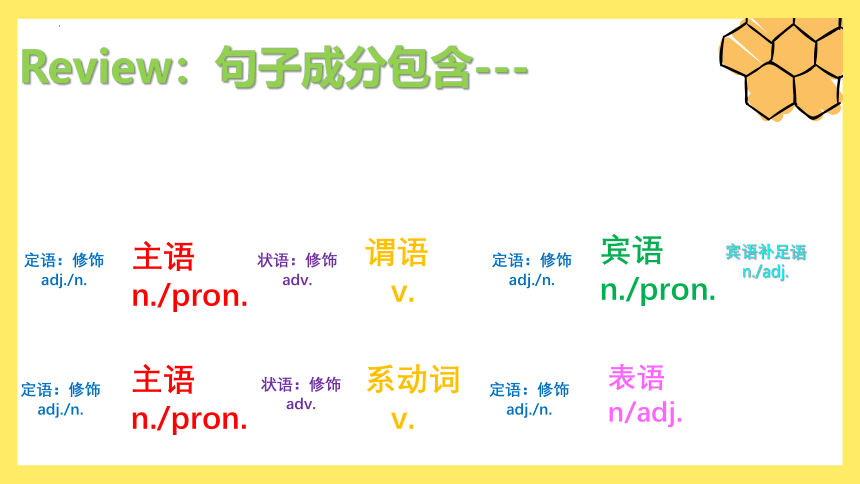 | |
| 格式 | pptx | ||
| 文件大小 | 540.1KB | ||
| 资源类型 | 教案 | ||
| 版本资源 | 人教版(2019) | ||
| 科目 | 英语 | ||
| 更新时间 | 2023-12-03 22:25:57 | ||
图片预览

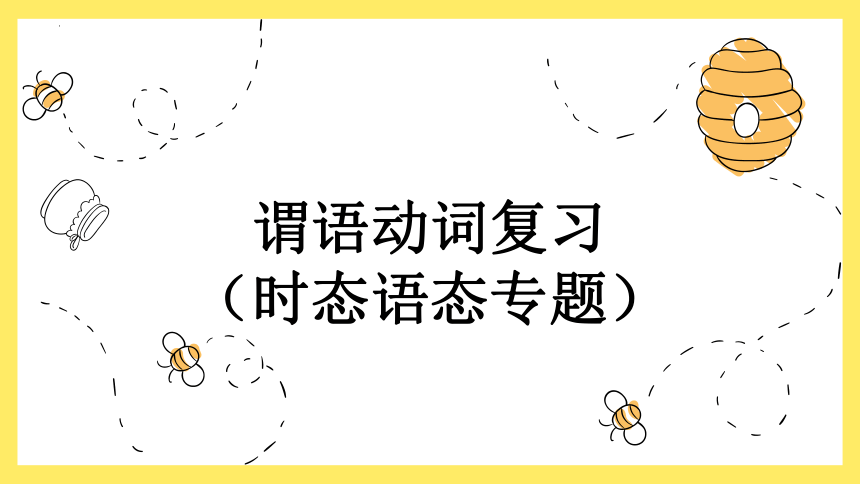


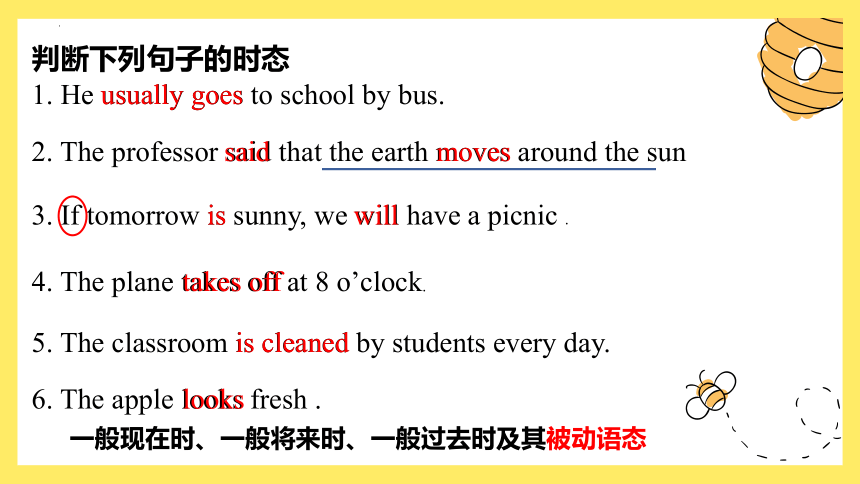
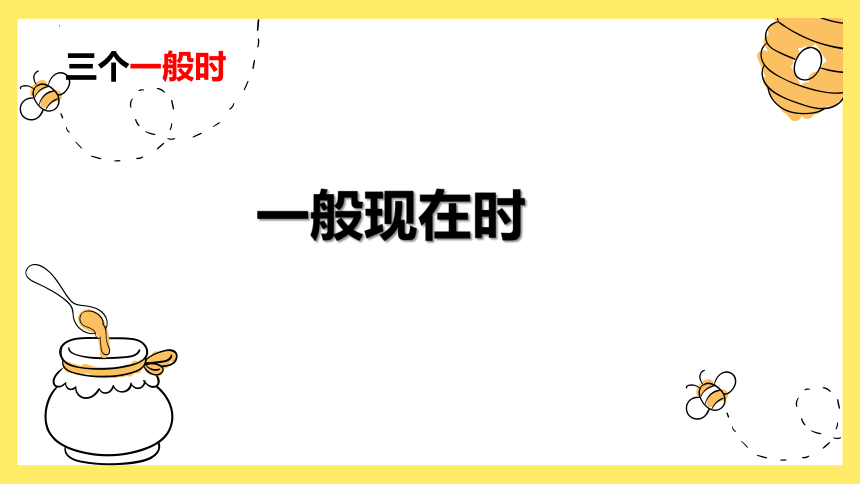
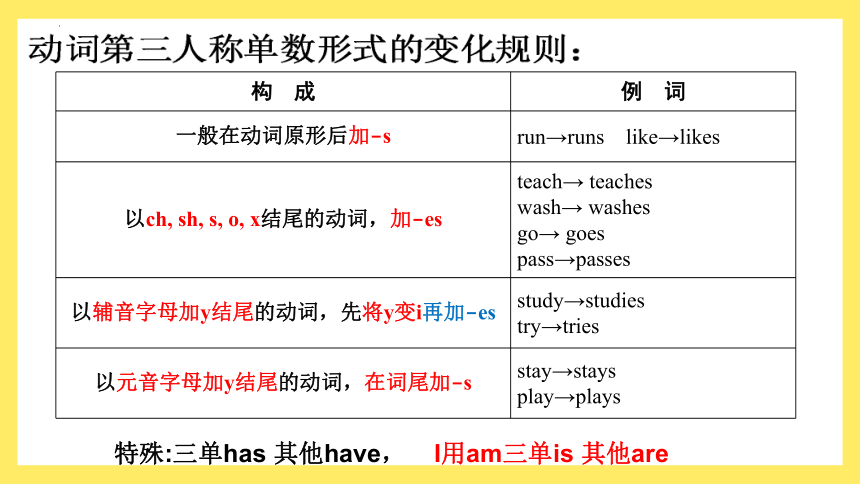
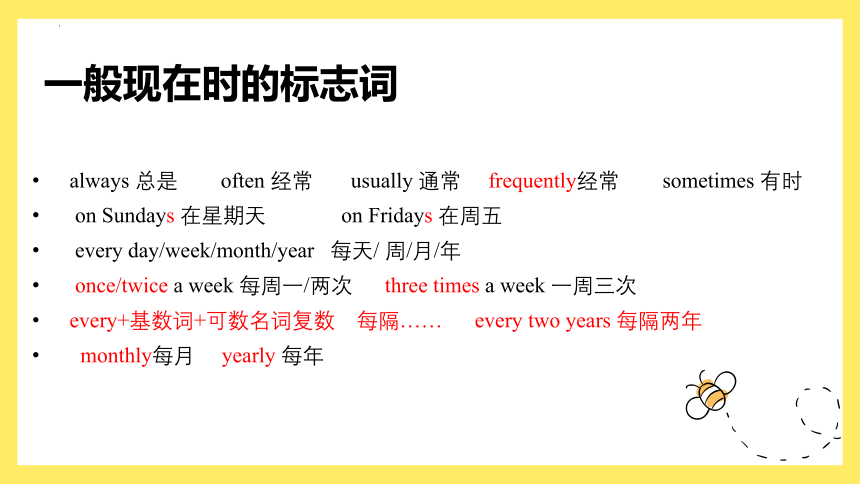
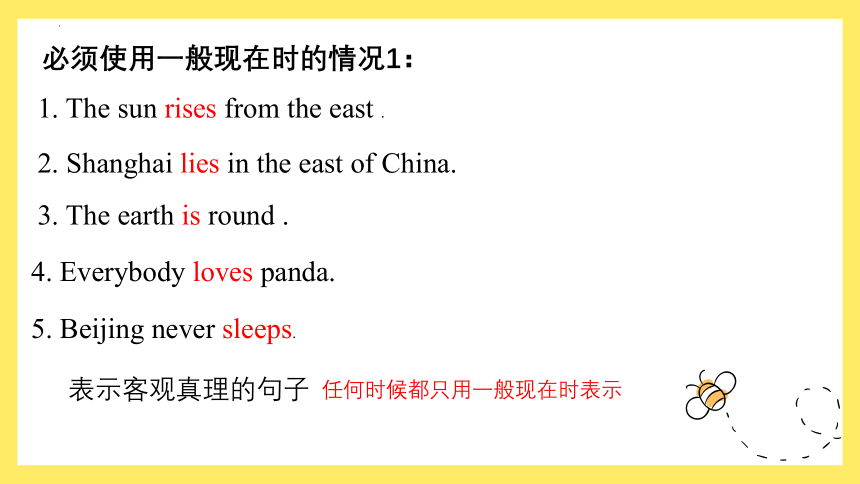
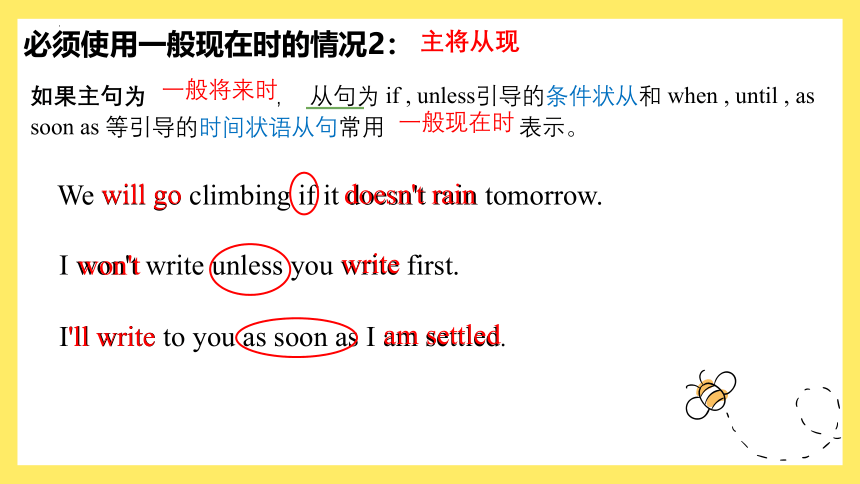
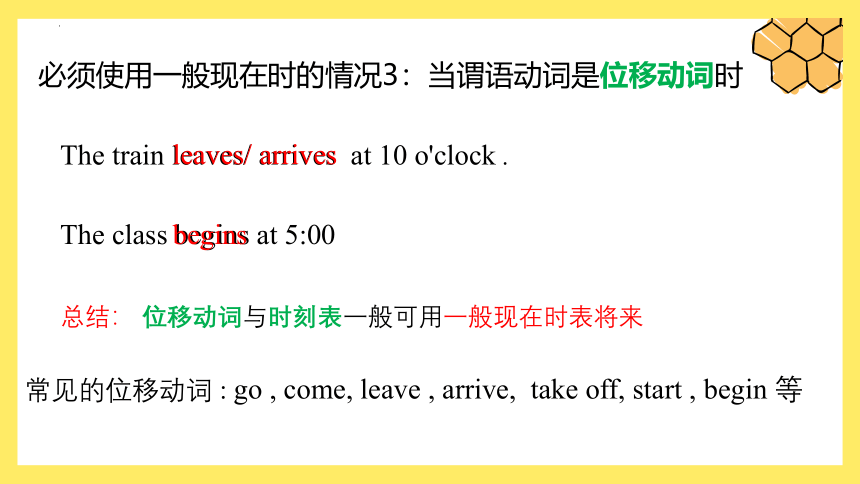

文档简介
(共94张PPT)
主语
n./pron.
谓语
v.
宾语
n./pron.
定语:修饰
adj./n.
定语:修饰
adj./n.
状语:修饰
adv.
主语
n./pron.
表语
n/adj.
系动词
v.
定语:修饰
adj./n.
状语:修饰
adv.
定语:修饰
adj./n.
宾语补足语
n./adj.
Review:句子成分包含---
谓语动词复习
(时态语态专题)
目录
CONTENTS
Honeybee
三个一般时
01
两个进行时
02
两个完成时
03
04
01
PART ONE
三个一般时
判断下列句子的时态
1. He usually goes to school by bus.
2. The professor said that the earth moves around the sun
3. If tomorrow is sunny, we will have a picnic .
4. The plane takes off at 8 o’clock.
usually
goes
moves
is
will
takes off
said
6. The apple looks fresh .
looks
5. The classroom is cleaned by students every day.
is cleaned
一般现在时、一般将来时、一般过去时及其被动语态
三个一般时
一般现在时
构 成 例 词
一般在动词原形后加 s run→runs like→likes
以ch, sh, s, o, x结尾的动词,加 es teach→ teaches
wash→ washes
go→ goes
pass→passes
以辅音字母加y结尾的动词,先将y变i再加 es study→studies
try→tries
以元音字母加y结尾的动词,在词尾加 s stay→stays
play→plays
特殊:三单has 其他have, I用am三单is 其他are
一般现在时的标志词
always 总是 often 经常 usually 通常 frequently经常 sometimes 有时
on Sundays 在星期天 on Fridays 在周五
every day/week/month/year 每天/ 周/月/年
once/twice a week 每周一/两次 three times a week 一周三次
every+基数词+可数名词复数 每隔…… every two years 每隔两年
monthly每月 yearly 每年
表示客观真理的句子
任何时候都只用一般现在时表示
1. The sun rises from the east .
2. Shanghai lies in the east of China.
3. The earth is round .
4. Everybody loves panda.
5. Beijing never sleeps.
必须使用一般现在时的情况1:
主将从现
如果主句为 , 从句为 if , unless引导的条件状从和 when , until , as soon as 等引导的时间状语从句常用 表示。
We will go climbing if it doesn't rain tomorrow.
I won't write unless you write first.
I'll write to you as soon as I am settled.
will go
doesn't rain
won't
write
'll write
am settled
一般将来时
一般现在时
必须使用一般现在时的情况2:
常见的位移动词 : go , come, leave , arrive, take off, start , begin 等
The train leaves/ arrives at 10 o'clock .
The class begins at 5:00
leaves/ arrives
begins
总结: 位移动词与时刻表一般可用一般现在时表将来
必须使用一般现在时的情况3:当谓语动词是位移动词时
be done
am is are
动词的过去分词
构 成 例 词
一般情况下在词尾加 ed help→helped clean→cleaned
play→played visit→visited
以不发音的字母e结尾的动词在词尾加 d move→moved use→used
close→closed taste→tasted
以辅音字母+y结尾的动词,把y变为i再 ed study→studied carry→carried
以一个元音字母加一个辅音字母结尾的重读闭音节词,双写结尾字母再加 ed 重读辅元辅 双写尾字母 stop→stopped
drop→dropped prefer→preferred
不规则动词变化见不规则动词变化表
一般现在时的被动语态
4. Silk is produced in Suzhou.
5.Colour TV sets are sold in that shop.
3.These bicycles are made in China.
2.English is widely spoken around the world.
1. Our classroom is cleaned by us every day.
划出下列句子的被动语态。
被动语态的标志
speak--spoke--spoken
make--made--made
sell--sold--sold
一般现在时被动语态翻译训练:
1、我们为那部电影所感动(move)。
2、我的钱被偷了。 (steal)
3. 许多房子在地震中遭到了破坏。(damage)
4. 如果我被给予足够的时间,我就去日本度假。
We are moved by the movie.
Our money is stolen .
Many houses are damaged in the earthquake.
If I am given enough time, I'll go to Japan for holiday.
steal --stole --stolen
give--gave--given
2.表示主语的某种属性特征的不及物动词,如read,write,sell,wash,clean,wear,open,cook,lock,shut等,用主动形式表示被动含义。
主动表示被动的用法:
1.系动词look,sound,feel,smell,taste,appear,seem,go,prove,turn,stay,become,fall,get,grow,keep+形容词/名词”构成的系表结构。
The music sounds wonderful.
The organges taste good.
The cotton feels soft.
His plan proves to be practical.
These books sell well.
The pen writes smoothly.
The cloth washes well.
Summary 一般现在时及其被动语态
1. 只有谓语动词才涉及到时态、语态
2.一般现在时的基本结构:动词原形---三单;被动语态---be done
3. 判断谓语动词选择什么时态、语态要结合:时间状语(标志词)、甚至整个语境。
4. 谓语动词只能用一般现在时的情况:
a. 客观真理
b.在复合句中,如果主句为一般现在时,从句为 if , unless引导的条件状从和 when , until , as soon as 等引导的时间状从(主将从现)
c. 位移动词(begin, leave, start…)、时刻表,现在表将来
d. 主动表被动(系动词无被动、表示特性的不及物动词主动表被动)
Practice
1.(2015·全国Ⅰ,67) Yangshuo (be) really beautiful.
2. (2015·全国Ⅱ,68) This cycle (go) day after day: The walls warm up during
the day and cool off during the night...
5.(2018全国I卷) While running regularly can't make you live forever,the review
says it ______(be) more effective at lengthening life than walking,
cycling or swimming is
3.(2017全国I卷) When fat and salt___________(remove) from food, the food
tastes as if it is missing something.
4.(2016·四川) The giant panda_______(love) by people throughout the world.
is
goes
is
are removed
tastes
is
is loved
says
can't
三个一般时
一般过去时
4.It is high time that the children should go to school.
找出下列句子的谓语动词,并总结出相关时态的知识点和考点。
2.We went Hawaii last summer.
1.Timmy lived in Washington in 1970.
3.It is high time that the children went to school.
lived
went
in 1970
last summer
过去的时间状语
固定句式
不规则变化见:不规则变化表
构 成 例 词
一般情况下在词尾加 ed help→helped clean→cleaned
play→played visit→visited
以不发音的字母e结尾的动词在词尾加 d move→moved use→used
close→closed taste→tasted
以辅音字母+y结尾的动词,把y变为i再加 ed study→studied carry→carried
以一个元音字母加一个辅音字母结尾的重读闭音节词,双写结尾字母再加 ed 重读辅元辅双写尾字母 再加-ed stop→stopped
drop→dropped
prefer→preferred
动词过去式变化规则
一般过去时的标志性时间词有:
three years ago
yesterday
in 2005
the day before yesterday
last week/month/year
long long ago
once upon a time
以下几种情况必须用一般过去时
②表示过去经常反复发生的动作,常与always, usually,often,never,sometimes等表示频度的
词连用。
When I was a child, I often played football in the street.
=When I was a child, I would play football in the street.
would +动词原形也可表示过去常常做某事
used to do 也表示过去常常做某事,同时强调现在不这样做了
I used to go to the library every Sunday.
①一般过去时表示过去某个时间段或某一段时间内发生的动作或存在的状态。
used to do sth.过去常常做某事
be used to doing sth.习惯于做某事
be used to do sth. 被用来做某事
Mike used to be a teacher.
he is used to living in countryside now.
Wood is used to make paper.
It's (high/about) time that +从句 谓语动词有两种形式:
① 谓语动词用过去式表示
②谓语动词用should + V词原形
是该做某事的时候了
It is (high) time that we should tell him the truth.
=It is (high) time that we told him the truth.
一般过去时的被动语态:
be done
was/were
动词的过去分词
例:Buildings _____________________(damage) yesterday.
were damaged
一、三单 I was/
He was
Summary 一般过去时
1. 只有谓语动词才涉及到时态、语态
2.一般过去时的基本结构:主动--Ved(无论主语是单/复);被动语态---was/were done(有单复数)
3. 判断谓语动词选择什么时态、语态要结合:时间状语(标志词)、甚至整个语境。
4. 谓语动词只能用一般过去时的情况:
过去某个时间段或某一段时间内发生的动作或存在的状态 (We went Hawaii last summer.)
表示过去经常反复发生的动作,常与always, usually, often, never, sometimes等表示频度的词连用
used to do 也表示过去常常做某事,同时强调现在不这样做了
固定句式:It‘s (high/about) time that +从句(该是……的时候了)
(It is (high) time that we told him the truth).
Practice
1. Lucy and her husband__________(search) the kitchen, checking every corner,
but turned up nothing.
2. We searched all morning for missing papers and finally________(discover)them
in a drawer.
3. When the children _________(ask)to read aloud to a dog and its trainer, they
were less upset.
4. The rabbit tried entering its hole while wearing its hat, and __________(stick)
5.In the study,a “jukebox(自动点唱机)”____________(creat),which allowed chimps to select their favorite classical,pop or rock music, or simply to choose silence.
searched
discovered
were asked
was stuck
was created
stick--stuck-stuck
棍子;坚持;卡住
1. Many people didn't have any preparation in their minds when the hurricane
____________(strike)the city.
2.In 1988,.Hawking's best-seller A Brief History of Time_______________(publish),
in which he put forward the idea that time itself has a beginning, and that it will
have an end.
3.Many people took part in the 10000-meter race, but only a number of them ____(be)
successful.
4.A couple of days ago,he ____________(announce)that he wanted to be removed from next year's Michelin Guide,saying that he wanted to give a new meaning of life.
5.Exactly five years ago,I_____________(invite)to a children's ball by a man high up in the business world.
struck
was published
were
announced
was invited
Practice
三个一般时
一般将来时
一般将来时:表示将来某个时间要发生的动作或存在的状态。
will+动词原形
(常用于第一人称)
shall+动词原形
否定式:shall not=shan't
构成为:
否定式:will not=won't
常用于第二、三人称,但在口语中各种人称都可以用will
will 和shall 的缩写都是 'll. 如 she'll
一般将来时的基本概念
一般将来时的时间标志性词:
one day
some day
next time
tomorrow
in the future
in the year to come
before long
in the few hours
in the following days
in 2089
除了will+do,
其他表示将来的形式
1. be going to 表将来
① 表示计划、安排要做的事情。
She is going to live in the country when she retires.
The speech is going to be at 3p.m on 9th March.
②表示现在的迹象推断未来可能发生的事情。
Look at the thick clouds,tomorrow is going to be another cold day.
Watch it, the wall is going to fall.
2. am/is/are doing 现在进行时表将来
表示按计划预定的或即将发生的动作,常与趋向性短暂动词:come、go、arrive、leave、start、begin连用等,表示的动作有即将发生之意。
When are you leaving for England
I am coming soon.
3. be to do 表将来
(1)表计划、安排、约定和意图。
She is to get married next month.
(2)用于报纸、广播等媒体宣布官方的决定或决议。
The President is to attend the opening ceremony.
(3)用在when和if引导的从句中表示“想要,需要”
When he was to open the door, he found his keys were nowhere.
In such dry weather,the flowers will have to be watered if they are to survived.
4. be about to do 表将来
表示正要做某事,马上就要做某事...(不能与表示将来的时间状语连用)
The Eanglish Evening Party is about to begin.
I was about to go out when it began to rain.
重点: be about to do sth ..........when(突然) .... 正要做某事,突然.....
I was about to go to bed when the phone rang.
I was about to do my homework when there is a power cut.
祈使句+and / or+陈述句:
用一般将来时
Work hard, and you’ll pass the exam.
Let’s keep to the point,or we will never reach any decisions.
and 后面跟好的结果
or的后面跟不理想的结果
本质=if 条件句,符合主将从现规则。
一般将来时的被动语态:
be done
动词的过去分词
will
These letters ______________(send) tomorrow.
will be sent
When the dam is completed,the Changjiang river will be controlled.
The new film will be shown on next Sunday.
6. You are to hand in the report today.
找出下列表示将来动作的谓语动词。
1. He will come back in ten minutes.
2. I shall always remember you.
4. Look at the dark clouds. It’s going to rain
3. He is going to speak on TV this evening.
7. The plane is about to take off.
will come back
shall remember
is going to speak
’s going to rain
5. I am leaving now.
am leaving
are to hand in
is about to take off
8.Study hard, or you will fail to pass the exam.
will fail to pass
Practice
1. I __________(meet) Mr.Simpson, the sport teacher,for my plan of exercise after
school next Monday if he is free.
will meet
2. Don't worry. The hard work that you do now ______________(repay)later in life.
will be repaid
3. Climate change___________(cause)great damage to agriculture and water supplies
and will increase diseases
will cause
4. Downsize your dinner plates. The less food put in front of you, the less food
you____________(eat)
will eat
5. As soon as I think of my motto,I __________(get) energetic again and devote
myself to my study.
will get
6. I__________(write) to you as soon as possible.
7. If he promises to help us, we________(win) the football match.
10. Study hard , and you ______________(pass)the exam.
11. Follow the doctor's advice,or you ________________(be) worse.
9. This activity _________________(hold) on 19th March.
12. Help others ,______ you will make the world nicer .
13. We _______________(punish)if we break the rule.
8. A lot of athletes________________(invite) to Beijing.
will write
will win
will be invited
will be held
will pass
will be
and
will be punished
Summary三个一般时
1. 过去某个时间、时间段发生的
2. 过去反复发生
客观真理
位移动词,时刻表
主将从现(复合句中,条件状从、时间状从)
系动词,主动表被动
will/shall
be going to
be doing
be about to
be to do
一般过去时
一般现在时
一般将来时
被动语态:was/were + done
被动语态:will be done
被动语态:am/is/are + done
谓语动词复习
(时态语态专题)
目录
CONTENTS
Honeybee
三个一般时
01
两个进行时
02
两个完成时
03
04
两个进行时
现在进行时
根据下列句子总结出现在进行时的基本结构及相关的时间状语。
2. We are having our English class from 4:00 to 6:00 .
1.Listen , she is playing the piano in the next room.
4.Tom is always coming late for classes , which makes his teacher very angry.
is playing
are having
from 4:00 to 6:00
Listen
3. At this moment, I am doing my homework, don't bother me.
At this moment
am doing
is
coming
always
现在进行时:1. 表示现在正在做或现阶段正在进行的动作或发生的事
构成为:
be doing
am is are
动词的现在分词
见变化规则表
标志词:
2. 动词提示词 : .......等
1. 时间提示词 :
now
right now
at present
at this moment
look
listen
these days
At this moment, I am doing my homework, don't bother me.
构 成 例 词
在动词原形后加 ing read—reading
以不发音字母e结尾的动词,去掉e再加 ing live—living
write—writing
以重读闭音节结尾且末尾只有一个辅音字母的动词,双写该辅音字母后再加 ing sit—sitting
begin—beginning
running
swimming
少数几个以ie结尾的动词,要变ie为y,再加 ing die—dying
lie—lying
tie—tying
现在分词变化规则:
2.表示反复出现的或习惯性的动作,常与always,continually, constantly, all the time等连用,往往含有赞赏、厌恶、遗憾等情绪。
She is constantly under pressure , which makes her break down.
He is countinually changing his mind !
The baby is crying out all the time !
She is so annoying! She is always leaving her dirty dishes in the sink .
2.表示马上要发生的事情,用于将来时态的语境。
表示按计划预定的或即将发生的动作,常与趋向性短暂动词:come、go、arrive、leave、start、begin连用等,表示的动作有即将发生之意。
When are you leaving for England
I am coming soon.
The problem is being discussed by students now.
A new railway is being built in this city.
The rivers and lakes in this area are being polluted by this factory.
Many interesting tests are being carried on .
The fund is being raised to protect wild animals.
现在进行时的被动语态的结构。
现在进行时的被动语态:
be doing
be done
取合集
be being done
am/is/are + being done
表示正在被.........
am/is/are + being done
演变过程:
将下列句子改为被动语态的句子:
1. They are painting our classroom.
2. Many people are always asking him silly questions.
3. They are frequently disturbing me.
A lot of wild animals are being killed by hunters in Africa.
Our classroom is being painted by them.
He is always being asked silly questions (by many people).
I am frequently being disturbed by them.
4. Hunters are killing a lot of wild animals in Africa.
Practice
1.—Hi, let’s go swimming.
—Sorry, I’m busy right now. I ___________(fill) in an application form for
graduate school.
5.We'd better do our Christmas shopping right now; time ________(run)out.
4.—What are you going to do this weekend
—I’m going to an exhibition of photographs which ____________(held) these
days.
3. Because the shop _________(close) down, all the T-shirts are sold at half prices.
am filling
2. Jane can't attend the meeting at 3 o'clock this afternoon because she__________
(teach) a class at that time.
is teaching
is closing
is being held
is running
两个进行时
过去进行时
6. I was having a bath when the phone rang.
1. They were playing football at ten o’clock yesterday morning.
2. I was washing my clothes at this time yesterday.
3.We were having English class from 9 to 12 yesterday.
5. Alice was always changing her mind.
4. It was raining when they left the station.
were playing
at ten o’clock yesterday morning
was washing
at this time yesterday
were having
from 9 to 12 yesterday
was raining
when
left
was always changing
was having
when the phone rang
根据下列句子总结出过去进行时的基本结构及相关的时间状语。
构成为:
be doing
was、were
动词的现在分词
过去进行时:1. 表示过去某个时间点正在做或过去某个阶段正在进行的动作;
2. 当过去某一动作发生时另一动作正在进行。
at ten yesterday
from nine to ten last evening
when, while,as
this time yesterday
the whole morning
at that time
all day yesterday
时间标志词
I was having a bath when the phone rang.
They were planting trees at this time yesterday.
1. was/were doing ...........when (突然) 正在做某事........突然 .......
I was doing my homework when someone knocked the door.
The man was sleeping downstairs when the earthquake happened.
I was walking the street when I heard my name called.
2. was/were about to ...........when (突然) 正要做某事........突然 .......
I was about to get out the room when the door was opened.
3. was/were on the point of doing ..........when (突然) 正在做某事........突然 .......
I was on the point of telephoning him when his letter arrived.
I was on the point of going out when the telephoned rang.
3.表示过去反复出现的或习惯性的动作,常与always,countinually, constantly, all the time 等连用,往往含有赞赏、厌恶、遗憾等情绪。
He was always playing tricks on me.
He was constantly changing his mind.
She was forever complaining.
过去进行时的被动语态:
be doing
be done
取合集
be being done
was/were + being done
演变过程:
将下列句子改为被动语态的句子:
They were planting trees at this time yesterday.
Trees were being planted by them at this time yesterday.
We were preparing the feast when it began to snow outside.
The feast was being prepared by us when it began to snow outside.
The police was questioning the man at that time .
The man was being questioned by the police at that time.
Summary(两个进行时)
现在进行时
am/is are + doing
am/is/are + being done
1. 表示现在正在做或现阶段正在进行的动作或发生的事
2. 表示反复出现的或习惯性的动作,常与always,continually, constantly, all the time等连用,往往含有赞赏、厌恶、遗憾等情绪。
3.表示马上要发生的事情,用于将来时态的语境
过去进行时
was/were + doing
was/were + being done
1. 表示过去某个时间点正在做或过去某个阶段正在进行的动作;
2.表示过去反复出现的或习惯性的动作,常与always,countinually, constantly, all the time 等连用,往往含有赞赏、厌恶、遗憾等情绪。
3. 当过去某一动作发生时另一动作正在进行(注意某些句式)。
目录
CONTENTS
Honeybee
三个一般时
01
两个进行时
02
两个完成时
03
04
谓语动词的时态语态
现在完成时
两个完成时
present(now)
future
past
Present Perfect Tense
现在完成时
主语 + have/ has + done(过去分词)
助动词,无意义
现在完成时的结构
Winter has already come,
will it still be far in spring
主语 + have/ has + done(过去分词)
否定形式 haven’t ( have not ) +过去分词
hasn’t ( has not ) +过去分词
疑问句 把助动词 have / has 放在句首
现在完成时的结构
注:主语若是第三人称单数助动词用 has
You have planted all the trees.
I have planted all the trees.
He/she has planted all the trees.
They have planted all the trees.
区别have 和 has的用法
主语若是第三人称单数助动词用 has
1) 表示到现在为止已经完成或刚刚完成的动作。
Now we have planted all the trees.
He has just come back.
They have built many buildings in this city.
现在完成时的用法
2) 表示过去发生的动作,强调结果或对现在的影响。
Someone has broken the window. (窗户现在是坏的)
I have already lost the key. (我现在没有钥匙)
I haven’t read that book yet . (不了解书的内容)
I have just cleaned my hands. (手是干净的)
常与already(已经), yet(已经), just(刚刚),ever(曾经)等词连用.
already: 常用于肯定句中.
yet: 常用于否定句,疑问句尾.
3) 表示从过去开始并持续到现在的动作或状态,常与包括现在在内的一段时间的状语连用。
She has learned English for 5 years.
He has lived in Beijing since 5 years ago.
since: (自…以来)
1)since+时间点
He has stayed here since 5 o’clock.
2)since+ 时间段+ ago
He has stayed here since 5 hours ago.
3)since+ 从句
She has taught English since he came here.
for: (长达)
for+ 时间段
He has kept the book for 2 weeks.
since , for 的用法:
用for 或since填空
Mr. Brown has had his TV ______ 15 years.
I’ve taken driving lessons _______last month.
My sister has had her cell phone ______a month .
My friends haven’t visited me ______few days ago.
We haven’t used our car _____ a long time .
She hasn’t had a good cup of coffee _____years.
Tom has worn glasses _______he was 7 years old.
for
since
for
since
for
for
since
现在完成时:
have / has done
常见时间标志性词:★★★★
since(自从)
ever since(自从)
so far / by now / up to now / up till now(迄今为止)
in/over/during the past/last few years在过去的几年
recent years (最近的几年)
recently/lately (最近)
for+一段时间
表示过去的动作对现在已经完成的状态,以及对现在造成的影响。
haven’t/hasn’t done(否定)
already/yet
It is the third time that you have been late for work this week,isn't it
It is the most instructive lecture that I have attended since I came to
this school.
这已经是这周你第三次工作迟到了,不是吗?
这是自从我到这个学校以来所参加过的最有教育意义的讲座。
It/This is the first/second/third time + that从句中,that从句中的谓语动词用现在完成时。
It/This is the best(worst, most interesting等) +名词+ that从句中,that从句中的谓语动词用现在完成时。
找出下列句子的谓语动词,并说出相关时态的知识点和考点。
1. I have finished my homework.
2. Up to now , the program has saved thousands of children who
would otherwise have died.
3. It is the third time that china has sent people into space.
4. It is the most attractive scenery that I have seen.
5. We’ve been to the U.S for three times.
6. Lihua has gone to Beijing.
have finished
has saved
Up to now
’ve been to
has gone to
辨析 have been to和 have gone to
My father has gone to Shanghai for a meeting.
他(已经)去了上海。
My father has been to Shanghai for a meeting.
他(曾经)去了上海。
She has been to China .
她(曾经)去过中国。(人已经回来了)
have been to someplace. 曾经去过某地,已经回来.
has gone to someplace.某人去了某地,还没有回来.
She has gone to China last week.
上周她去了上海 。(人可能回来了也可能没回来)
用have/has been to, have/has gone to填空:
1.—Where is your brother
—He ____________ the shop. He’ll be back soon.
2. — ______ you ever _________ to America
—Yes, I ___________ New York twice.
3. —Here you are at last! Where _____ you _____
—I _____________ London.
4. —David _____________Australia.
—I’m sure he’s already arrived.
5. —Is Benny here
—No, he __________ the school library. He left
five minutes ago.
has gone to
Have been to
have been to
have been
have been to
has gone to
has gone to
现在完成时的被动语态:
have /has done
be done
取合集
have/has been done
have/has been done
2.The child has been taken care of by grandma all these years.
1. Tom's novel has not been published yet.
3. The new schools have been set up.
4. Some new factories have been built in the city since last year.
练一练:
①Years ago we didn’t know this,but recent science ___________ (show)that people
who don’t sleep well soon get ill.
② My brother is an actor. He______________ (appear)in several films so far.
③The construction of the two new railway lines__________________(complete) by now
④Up to now ,the program___________ (save)thousands of children who would otherwise
have died.
⑤It is the third time that China ________(sent) people into space.
⑥It is the most attractive scenery that I ___________(see) .
has shown
has appeared
has been completed
has saved
has sent
have seen
Mom: What are you doing
Dad: I 1. ___________ (plan) to take the children to the beach this weekend.
Mom: That's great! We 2. _______________ (not,go,) out for a long time.
Dad: Yes. It's been five months since we 3. _____________ (climb) the
mountain last time. And this kind of weather is rare for this season.
Mom: So we must seize this chance and go to the beach. I will tell the children
about this right away. They 4. ________ (be) very happy.
Dad: They 5. ___________ (know) about it for quite a while. I 6. ________ (tell) t
them an hour ago.
综合运用:用括号内单词的正确形式完成下面对话:
am planning
haven't gone
have climbed
will be
have known
told
2. The man took out his iPad and saw the latest film while his car _______________
(repair).
5. People were not allowed to enter the reading room because it _________________(paint).
4. After school we went to the readingroom to do some reading, only to be told that it ________________(decorate).
1. This road ______________(built) this time last year.
Practice
3. I __________ (watch) TV at 9 o'clock last night_________somebody knocked on
my window .
was being built
was being repaired
was watching
when
was being decorated
was being painted
谓语动词的时态语态
过去完成时
二、判断下列句子的时态,并总结出各相关时态的知识点和考点。
1. The movie had begun before he arrived here..
2. By the end of yesterday,we had received over 1,000 letters from all
over the world.
3. Three days before/earlier, I had arrived Beijing.
4. That was the second time that she had seen her grandfather.
5. Hardly had I got into the room when it began to rain.
6. No sooner had I got into the room than it began to rain.
had begun
had received
had arrived
had seen
By the end of yesterday
Three days before/earlier
That was the second time
过去完成时:
had done
hadn't done(否定)
1. 表示过去某个时间之前已经完成的动作或存在的状态,即“过去的过去”,句中有明显的过去式参照动作或时间状语标志性词,这种时态从来不孤立使用。
①-------------|----------------- |---------------------|-------->
过去的过去 过去 现在
had done did do
When I got to the station, the train had already left.
发生在 got 之前
常见时间标志性词:★★★★
by+过去时间点
by the end of +过去时间点
一段时间+before
一段时间+earlier.
I had finished reading the novel by nine o'clock last night.
We had learned over two thousand English words by the end of last term.
2015年高考卷(全国1)语法填空It was raining lightly when I arrived in Yangshuo just before dawn. But I didn't care . A few hours ___________, I'd been at home in Hongkong, with its choking smog.
before/earlier
hardly…when…;no sooner…than… 刚一.........就
It/that/this was the first (second, etc) time (that)…
句型中用过去完成时。
Hardly had he begun to speak when the audience interrupted him.
他刚开始演讲,听众就打断了他。
No sooner had he arrived than he went away again.
他刚到就又走了。
It was the third time that he had been out of work that year.
这是他那一年第三次失业了
过去完成时的被动语态:
had done
be done
取合集
had been done
had been done
1. Shakespeare's play Hamlet had been made into at least ten different films by the end of 2015.
2. By 16:30, which was almost closing time, nearly all the paintings had been sold out.
3. He said that much money had been spent on the walking street.
4. It was the second time that my car had been damaged by the thunderstorm this year.
练一练:
1. By the time Jack returned home from England, his son__________
(graduate) from college.
had graduated
2. Last month, the Japanese government expressed their thanks for the aid they_____________(receive) From China.
had received
3. We arrived at work in the morning and found that somebody _____________(break) into the office during the night.
had broken
4. She was surprised to find the fridge empty; the child _________(eat) everything!
had eaten
5. It was the third time that he ___________(enter) the house.
had entered
A cow and a fox went out to search for food together.
They 1. ________ (go) only a few miles before they saw a lion coming their way.
They were both very frightened. The fox thought of a way of saving his own life,
and went up to the lion and said in his ear, “I 2. ________ (help) you get hold of the
cow without the trouble of hunting him, if you let me go free.” The lion agreed, and
the fox then led the cow by a hidden pit (坑), which some hunter 3. ________ (dig)
as a trap for wild animals, and the cow fell into it. When the lion saw that the cow
4. _____________ (catch) and couldn't get away, he turned his attention to the fox.
He soon finished him off, and then went on to eat the cow.
Betray (背叛 ) a friend, and you'll often find you have destroyed yourself.
综合运用:用括号内单词的正确形式完成下面对话:
had gone
will help
had dug
had been caught
主语
n./pron.
谓语
v.
宾语
n./pron.
定语:修饰
adj./n.
定语:修饰
adj./n.
状语:修饰
adv.
主语
n./pron.
表语
n/adj.
系动词
v.
定语:修饰
adj./n.
状语:修饰
adv.
定语:修饰
adj./n.
宾语补足语
n./adj.
Review:句子成分包含---
谓语动词复习
(时态语态专题)
目录
CONTENTS
Honeybee
三个一般时
01
两个进行时
02
两个完成时
03
04
01
PART ONE
三个一般时
判断下列句子的时态
1. He usually goes to school by bus.
2. The professor said that the earth moves around the sun
3. If tomorrow is sunny, we will have a picnic .
4. The plane takes off at 8 o’clock.
usually
goes
moves
is
will
takes off
said
6. The apple looks fresh .
looks
5. The classroom is cleaned by students every day.
is cleaned
一般现在时、一般将来时、一般过去时及其被动语态
三个一般时
一般现在时
构 成 例 词
一般在动词原形后加 s run→runs like→likes
以ch, sh, s, o, x结尾的动词,加 es teach→ teaches
wash→ washes
go→ goes
pass→passes
以辅音字母加y结尾的动词,先将y变i再加 es study→studies
try→tries
以元音字母加y结尾的动词,在词尾加 s stay→stays
play→plays
特殊:三单has 其他have, I用am三单is 其他are
一般现在时的标志词
always 总是 often 经常 usually 通常 frequently经常 sometimes 有时
on Sundays 在星期天 on Fridays 在周五
every day/week/month/year 每天/ 周/月/年
once/twice a week 每周一/两次 three times a week 一周三次
every+基数词+可数名词复数 每隔…… every two years 每隔两年
monthly每月 yearly 每年
表示客观真理的句子
任何时候都只用一般现在时表示
1. The sun rises from the east .
2. Shanghai lies in the east of China.
3. The earth is round .
4. Everybody loves panda.
5. Beijing never sleeps.
必须使用一般现在时的情况1:
主将从现
如果主句为 , 从句为 if , unless引导的条件状从和 when , until , as soon as 等引导的时间状语从句常用 表示。
We will go climbing if it doesn't rain tomorrow.
I won't write unless you write first.
I'll write to you as soon as I am settled.
will go
doesn't rain
won't
write
'll write
am settled
一般将来时
一般现在时
必须使用一般现在时的情况2:
常见的位移动词 : go , come, leave , arrive, take off, start , begin 等
The train leaves/ arrives at 10 o'clock .
The class begins at 5:00
leaves/ arrives
begins
总结: 位移动词与时刻表一般可用一般现在时表将来
必须使用一般现在时的情况3:当谓语动词是位移动词时
be done
am is are
动词的过去分词
构 成 例 词
一般情况下在词尾加 ed help→helped clean→cleaned
play→played visit→visited
以不发音的字母e结尾的动词在词尾加 d move→moved use→used
close→closed taste→tasted
以辅音字母+y结尾的动词,把y变为i再 ed study→studied carry→carried
以一个元音字母加一个辅音字母结尾的重读闭音节词,双写结尾字母再加 ed 重读辅元辅 双写尾字母 stop→stopped
drop→dropped prefer→preferred
不规则动词变化见不规则动词变化表
一般现在时的被动语态
4. Silk is produced in Suzhou.
5.Colour TV sets are sold in that shop.
3.These bicycles are made in China.
2.English is widely spoken around the world.
1. Our classroom is cleaned by us every day.
划出下列句子的被动语态。
被动语态的标志
speak--spoke--spoken
make--made--made
sell--sold--sold
一般现在时被动语态翻译训练:
1、我们为那部电影所感动(move)。
2、我的钱被偷了。 (steal)
3. 许多房子在地震中遭到了破坏。(damage)
4. 如果我被给予足够的时间,我就去日本度假。
We are moved by the movie.
Our money is stolen .
Many houses are damaged in the earthquake.
If I am given enough time, I'll go to Japan for holiday.
steal --stole --stolen
give--gave--given
2.表示主语的某种属性特征的不及物动词,如read,write,sell,wash,clean,wear,open,cook,lock,shut等,用主动形式表示被动含义。
主动表示被动的用法:
1.系动词look,sound,feel,smell,taste,appear,seem,go,prove,turn,stay,become,fall,get,grow,keep+形容词/名词”构成的系表结构。
The music sounds wonderful.
The organges taste good.
The cotton feels soft.
His plan proves to be practical.
These books sell well.
The pen writes smoothly.
The cloth washes well.
Summary 一般现在时及其被动语态
1. 只有谓语动词才涉及到时态、语态
2.一般现在时的基本结构:动词原形---三单;被动语态---be done
3. 判断谓语动词选择什么时态、语态要结合:时间状语(标志词)、甚至整个语境。
4. 谓语动词只能用一般现在时的情况:
a. 客观真理
b.在复合句中,如果主句为一般现在时,从句为 if , unless引导的条件状从和 when , until , as soon as 等引导的时间状从(主将从现)
c. 位移动词(begin, leave, start…)、时刻表,现在表将来
d. 主动表被动(系动词无被动、表示特性的不及物动词主动表被动)
Practice
1.(2015·全国Ⅰ,67) Yangshuo (be) really beautiful.
2. (2015·全国Ⅱ,68) This cycle (go) day after day: The walls warm up during
the day and cool off during the night...
5.(2018全国I卷) While running regularly can't make you live forever,the review
says it ______(be) more effective at lengthening life than walking,
cycling or swimming is
3.(2017全国I卷) When fat and salt___________(remove) from food, the food
tastes as if it is missing something.
4.(2016·四川) The giant panda_______(love) by people throughout the world.
is
goes
is
are removed
tastes
is
is loved
says
can't
三个一般时
一般过去时
4.It is high time that the children should go to school.
找出下列句子的谓语动词,并总结出相关时态的知识点和考点。
2.We went Hawaii last summer.
1.Timmy lived in Washington in 1970.
3.It is high time that the children went to school.
lived
went
in 1970
last summer
过去的时间状语
固定句式
不规则变化见:不规则变化表
构 成 例 词
一般情况下在词尾加 ed help→helped clean→cleaned
play→played visit→visited
以不发音的字母e结尾的动词在词尾加 d move→moved use→used
close→closed taste→tasted
以辅音字母+y结尾的动词,把y变为i再加 ed study→studied carry→carried
以一个元音字母加一个辅音字母结尾的重读闭音节词,双写结尾字母再加 ed 重读辅元辅双写尾字母 再加-ed stop→stopped
drop→dropped
prefer→preferred
动词过去式变化规则
一般过去时的标志性时间词有:
three years ago
yesterday
in 2005
the day before yesterday
last week/month/year
long long ago
once upon a time
以下几种情况必须用一般过去时
②表示过去经常反复发生的动作,常与always, usually,often,never,sometimes等表示频度的
词连用。
When I was a child, I often played football in the street.
=When I was a child, I would play football in the street.
would +动词原形也可表示过去常常做某事
used to do 也表示过去常常做某事,同时强调现在不这样做了
I used to go to the library every Sunday.
①一般过去时表示过去某个时间段或某一段时间内发生的动作或存在的状态。
used to do sth.过去常常做某事
be used to doing sth.习惯于做某事
be used to do sth. 被用来做某事
Mike used to be a teacher.
he is used to living in countryside now.
Wood is used to make paper.
It's (high/about) time that +从句 谓语动词有两种形式:
① 谓语动词用过去式表示
②谓语动词用should + V词原形
是该做某事的时候了
It is (high) time that we should tell him the truth.
=It is (high) time that we told him the truth.
一般过去时的被动语态:
be done
was/were
动词的过去分词
例:Buildings _____________________(damage) yesterday.
were damaged
一、三单 I was/
He was
Summary 一般过去时
1. 只有谓语动词才涉及到时态、语态
2.一般过去时的基本结构:主动--Ved(无论主语是单/复);被动语态---was/were done(有单复数)
3. 判断谓语动词选择什么时态、语态要结合:时间状语(标志词)、甚至整个语境。
4. 谓语动词只能用一般过去时的情况:
过去某个时间段或某一段时间内发生的动作或存在的状态 (We went Hawaii last summer.)
表示过去经常反复发生的动作,常与always, usually, often, never, sometimes等表示频度的词连用
used to do 也表示过去常常做某事,同时强调现在不这样做了
固定句式:It‘s (high/about) time that +从句(该是……的时候了)
(It is (high) time that we told him the truth).
Practice
1. Lucy and her husband__________(search) the kitchen, checking every corner,
but turned up nothing.
2. We searched all morning for missing papers and finally________(discover)them
in a drawer.
3. When the children _________(ask)to read aloud to a dog and its trainer, they
were less upset.
4. The rabbit tried entering its hole while wearing its hat, and __________(stick)
5.In the study,a “jukebox(自动点唱机)”____________(creat),which allowed chimps to select their favorite classical,pop or rock music, or simply to choose silence.
searched
discovered
were asked
was stuck
was created
stick--stuck-stuck
棍子;坚持;卡住
1. Many people didn't have any preparation in their minds when the hurricane
____________(strike)the city.
2.In 1988,.Hawking's best-seller A Brief History of Time_______________(publish),
in which he put forward the idea that time itself has a beginning, and that it will
have an end.
3.Many people took part in the 10000-meter race, but only a number of them ____(be)
successful.
4.A couple of days ago,he ____________(announce)that he wanted to be removed from next year's Michelin Guide,saying that he wanted to give a new meaning of life.
5.Exactly five years ago,I_____________(invite)to a children's ball by a man high up in the business world.
struck
was published
were
announced
was invited
Practice
三个一般时
一般将来时
一般将来时:表示将来某个时间要发生的动作或存在的状态。
will+动词原形
(常用于第一人称)
shall+动词原形
否定式:shall not=shan't
构成为:
否定式:will not=won't
常用于第二、三人称,但在口语中各种人称都可以用will
will 和shall 的缩写都是 'll. 如 she'll
一般将来时的基本概念
一般将来时的时间标志性词:
one day
some day
next time
tomorrow
in the future
in the year to come
before long
in the few hours
in the following days
in 2089
除了will+do,
其他表示将来的形式
1. be going to 表将来
① 表示计划、安排要做的事情。
She is going to live in the country when she retires.
The speech is going to be at 3p.m on 9th March.
②表示现在的迹象推断未来可能发生的事情。
Look at the thick clouds,tomorrow is going to be another cold day.
Watch it, the wall is going to fall.
2. am/is/are doing 现在进行时表将来
表示按计划预定的或即将发生的动作,常与趋向性短暂动词:come、go、arrive、leave、start、begin连用等,表示的动作有即将发生之意。
When are you leaving for England
I am coming soon.
3. be to do 表将来
(1)表计划、安排、约定和意图。
She is to get married next month.
(2)用于报纸、广播等媒体宣布官方的决定或决议。
The President is to attend the opening ceremony.
(3)用在when和if引导的从句中表示“想要,需要”
When he was to open the door, he found his keys were nowhere.
In such dry weather,the flowers will have to be watered if they are to survived.
4. be about to do 表将来
表示正要做某事,马上就要做某事...(不能与表示将来的时间状语连用)
The Eanglish Evening Party is about to begin.
I was about to go out when it began to rain.
重点: be about to do sth ..........when(突然) .... 正要做某事,突然.....
I was about to go to bed when the phone rang.
I was about to do my homework when there is a power cut.
祈使句+and / or+陈述句:
用一般将来时
Work hard, and you’ll pass the exam.
Let’s keep to the point,or we will never reach any decisions.
and 后面跟好的结果
or的后面跟不理想的结果
本质=if 条件句,符合主将从现规则。
一般将来时的被动语态:
be done
动词的过去分词
will
These letters ______________(send) tomorrow.
will be sent
When the dam is completed,the Changjiang river will be controlled.
The new film will be shown on next Sunday.
6. You are to hand in the report today.
找出下列表示将来动作的谓语动词。
1. He will come back in ten minutes.
2. I shall always remember you.
4. Look at the dark clouds. It’s going to rain
3. He is going to speak on TV this evening.
7. The plane is about to take off.
will come back
shall remember
is going to speak
’s going to rain
5. I am leaving now.
am leaving
are to hand in
is about to take off
8.Study hard, or you will fail to pass the exam.
will fail to pass
Practice
1. I __________(meet) Mr.Simpson, the sport teacher,for my plan of exercise after
school next Monday if he is free.
will meet
2. Don't worry. The hard work that you do now ______________(repay)later in life.
will be repaid
3. Climate change___________(cause)great damage to agriculture and water supplies
and will increase diseases
will cause
4. Downsize your dinner plates. The less food put in front of you, the less food
you____________(eat)
will eat
5. As soon as I think of my motto,I __________(get) energetic again and devote
myself to my study.
will get
6. I__________(write) to you as soon as possible.
7. If he promises to help us, we________(win) the football match.
10. Study hard , and you ______________(pass)the exam.
11. Follow the doctor's advice,or you ________________(be) worse.
9. This activity _________________(hold) on 19th March.
12. Help others ,______ you will make the world nicer .
13. We _______________(punish)if we break the rule.
8. A lot of athletes________________(invite) to Beijing.
will write
will win
will be invited
will be held
will pass
will be
and
will be punished
Summary三个一般时
1. 过去某个时间、时间段发生的
2. 过去反复发生
客观真理
位移动词,时刻表
主将从现(复合句中,条件状从、时间状从)
系动词,主动表被动
will/shall
be going to
be doing
be about to
be to do
一般过去时
一般现在时
一般将来时
被动语态:was/were + done
被动语态:will be done
被动语态:am/is/are + done
谓语动词复习
(时态语态专题)
目录
CONTENTS
Honeybee
三个一般时
01
两个进行时
02
两个完成时
03
04
两个进行时
现在进行时
根据下列句子总结出现在进行时的基本结构及相关的时间状语。
2. We are having our English class from 4:00 to 6:00 .
1.Listen , she is playing the piano in the next room.
4.Tom is always coming late for classes , which makes his teacher very angry.
is playing
are having
from 4:00 to 6:00
Listen
3. At this moment, I am doing my homework, don't bother me.
At this moment
am doing
is
coming
always
现在进行时:1. 表示现在正在做或现阶段正在进行的动作或发生的事
构成为:
be doing
am is are
动词的现在分词
见变化规则表
标志词:
2. 动词提示词 : .......等
1. 时间提示词 :
now
right now
at present
at this moment
look
listen
these days
At this moment, I am doing my homework, don't bother me.
构 成 例 词
在动词原形后加 ing read—reading
以不发音字母e结尾的动词,去掉e再加 ing live—living
write—writing
以重读闭音节结尾且末尾只有一个辅音字母的动词,双写该辅音字母后再加 ing sit—sitting
begin—beginning
running
swimming
少数几个以ie结尾的动词,要变ie为y,再加 ing die—dying
lie—lying
tie—tying
现在分词变化规则:
2.表示反复出现的或习惯性的动作,常与always,continually, constantly, all the time等连用,往往含有赞赏、厌恶、遗憾等情绪。
She is constantly under pressure , which makes her break down.
He is countinually changing his mind !
The baby is crying out all the time !
She is so annoying! She is always leaving her dirty dishes in the sink .
2.表示马上要发生的事情,用于将来时态的语境。
表示按计划预定的或即将发生的动作,常与趋向性短暂动词:come、go、arrive、leave、start、begin连用等,表示的动作有即将发生之意。
When are you leaving for England
I am coming soon.
The problem is being discussed by students now.
A new railway is being built in this city.
The rivers and lakes in this area are being polluted by this factory.
Many interesting tests are being carried on .
The fund is being raised to protect wild animals.
现在进行时的被动语态的结构。
现在进行时的被动语态:
be doing
be done
取合集
be being done
am/is/are + being done
表示正在被.........
am/is/are + being done
演变过程:
将下列句子改为被动语态的句子:
1. They are painting our classroom.
2. Many people are always asking him silly questions.
3. They are frequently disturbing me.
A lot of wild animals are being killed by hunters in Africa.
Our classroom is being painted by them.
He is always being asked silly questions (by many people).
I am frequently being disturbed by them.
4. Hunters are killing a lot of wild animals in Africa.
Practice
1.—Hi, let’s go swimming.
—Sorry, I’m busy right now. I ___________(fill) in an application form for
graduate school.
5.We'd better do our Christmas shopping right now; time ________(run)out.
4.—What are you going to do this weekend
—I’m going to an exhibition of photographs which ____________(held) these
days.
3. Because the shop _________(close) down, all the T-shirts are sold at half prices.
am filling
2. Jane can't attend the meeting at 3 o'clock this afternoon because she__________
(teach) a class at that time.
is teaching
is closing
is being held
is running
两个进行时
过去进行时
6. I was having a bath when the phone rang.
1. They were playing football at ten o’clock yesterday morning.
2. I was washing my clothes at this time yesterday.
3.We were having English class from 9 to 12 yesterday.
5. Alice was always changing her mind.
4. It was raining when they left the station.
were playing
at ten o’clock yesterday morning
was washing
at this time yesterday
were having
from 9 to 12 yesterday
was raining
when
left
was always changing
was having
when the phone rang
根据下列句子总结出过去进行时的基本结构及相关的时间状语。
构成为:
be doing
was、were
动词的现在分词
过去进行时:1. 表示过去某个时间点正在做或过去某个阶段正在进行的动作;
2. 当过去某一动作发生时另一动作正在进行。
at ten yesterday
from nine to ten last evening
when, while,as
this time yesterday
the whole morning
at that time
all day yesterday
时间标志词
I was having a bath when the phone rang.
They were planting trees at this time yesterday.
1. was/were doing ...........when (突然) 正在做某事........突然 .......
I was doing my homework when someone knocked the door.
The man was sleeping downstairs when the earthquake happened.
I was walking the street when I heard my name called.
2. was/were about to ...........when (突然) 正要做某事........突然 .......
I was about to get out the room when the door was opened.
3. was/were on the point of doing ..........when (突然) 正在做某事........突然 .......
I was on the point of telephoning him when his letter arrived.
I was on the point of going out when the telephoned rang.
3.表示过去反复出现的或习惯性的动作,常与always,countinually, constantly, all the time 等连用,往往含有赞赏、厌恶、遗憾等情绪。
He was always playing tricks on me.
He was constantly changing his mind.
She was forever complaining.
过去进行时的被动语态:
be doing
be done
取合集
be being done
was/were + being done
演变过程:
将下列句子改为被动语态的句子:
They were planting trees at this time yesterday.
Trees were being planted by them at this time yesterday.
We were preparing the feast when it began to snow outside.
The feast was being prepared by us when it began to snow outside.
The police was questioning the man at that time .
The man was being questioned by the police at that time.
Summary(两个进行时)
现在进行时
am/is are + doing
am/is/are + being done
1. 表示现在正在做或现阶段正在进行的动作或发生的事
2. 表示反复出现的或习惯性的动作,常与always,continually, constantly, all the time等连用,往往含有赞赏、厌恶、遗憾等情绪。
3.表示马上要发生的事情,用于将来时态的语境
过去进行时
was/were + doing
was/were + being done
1. 表示过去某个时间点正在做或过去某个阶段正在进行的动作;
2.表示过去反复出现的或习惯性的动作,常与always,countinually, constantly, all the time 等连用,往往含有赞赏、厌恶、遗憾等情绪。
3. 当过去某一动作发生时另一动作正在进行(注意某些句式)。
目录
CONTENTS
Honeybee
三个一般时
01
两个进行时
02
两个完成时
03
04
谓语动词的时态语态
现在完成时
两个完成时
present(now)
future
past
Present Perfect Tense
现在完成时
主语 + have/ has + done(过去分词)
助动词,无意义
现在完成时的结构
Winter has already come,
will it still be far in spring
主语 + have/ has + done(过去分词)
否定形式 haven’t ( have not ) +过去分词
hasn’t ( has not ) +过去分词
疑问句 把助动词 have / has 放在句首
现在完成时的结构
注:主语若是第三人称单数助动词用 has
You have planted all the trees.
I have planted all the trees.
He/she has planted all the trees.
They have planted all the trees.
区别have 和 has的用法
主语若是第三人称单数助动词用 has
1) 表示到现在为止已经完成或刚刚完成的动作。
Now we have planted all the trees.
He has just come back.
They have built many buildings in this city.
现在完成时的用法
2) 表示过去发生的动作,强调结果或对现在的影响。
Someone has broken the window. (窗户现在是坏的)
I have already lost the key. (我现在没有钥匙)
I haven’t read that book yet . (不了解书的内容)
I have just cleaned my hands. (手是干净的)
常与already(已经), yet(已经), just(刚刚),ever(曾经)等词连用.
already: 常用于肯定句中.
yet: 常用于否定句,疑问句尾.
3) 表示从过去开始并持续到现在的动作或状态,常与包括现在在内的一段时间的状语连用。
She has learned English for 5 years.
He has lived in Beijing since 5 years ago.
since: (自…以来)
1)since+时间点
He has stayed here since 5 o’clock.
2)since+ 时间段+ ago
He has stayed here since 5 hours ago.
3)since+ 从句
She has taught English since he came here.
for: (长达)
for+ 时间段
He has kept the book for 2 weeks.
since , for 的用法:
用for 或since填空
Mr. Brown has had his TV ______ 15 years.
I’ve taken driving lessons _______last month.
My sister has had her cell phone ______a month .
My friends haven’t visited me ______few days ago.
We haven’t used our car _____ a long time .
She hasn’t had a good cup of coffee _____years.
Tom has worn glasses _______he was 7 years old.
for
since
for
since
for
for
since
现在完成时:
have / has done
常见时间标志性词:★★★★
since(自从)
ever since(自从)
so far / by now / up to now / up till now(迄今为止)
in/over/during the past/last few years在过去的几年
recent years (最近的几年)
recently/lately (最近)
for+一段时间
表示过去的动作对现在已经完成的状态,以及对现在造成的影响。
haven’t/hasn’t done(否定)
already/yet
It is the third time that you have been late for work this week,isn't it
It is the most instructive lecture that I have attended since I came to
this school.
这已经是这周你第三次工作迟到了,不是吗?
这是自从我到这个学校以来所参加过的最有教育意义的讲座。
It/This is the first/second/third time + that从句中,that从句中的谓语动词用现在完成时。
It/This is the best(worst, most interesting等) +名词+ that从句中,that从句中的谓语动词用现在完成时。
找出下列句子的谓语动词,并说出相关时态的知识点和考点。
1. I have finished my homework.
2. Up to now , the program has saved thousands of children who
would otherwise have died.
3. It is the third time that china has sent people into space.
4. It is the most attractive scenery that I have seen.
5. We’ve been to the U.S for three times.
6. Lihua has gone to Beijing.
have finished
has saved
Up to now
’ve been to
has gone to
辨析 have been to和 have gone to
My father has gone to Shanghai for a meeting.
他(已经)去了上海。
My father has been to Shanghai for a meeting.
他(曾经)去了上海。
She has been to China .
她(曾经)去过中国。(人已经回来了)
have been to someplace. 曾经去过某地,已经回来.
has gone to someplace.某人去了某地,还没有回来.
She has gone to China last week.
上周她去了上海 。(人可能回来了也可能没回来)
用have/has been to, have/has gone to填空:
1.—Where is your brother
—He ____________ the shop. He’ll be back soon.
2. — ______ you ever _________ to America
—Yes, I ___________ New York twice.
3. —Here you are at last! Where _____ you _____
—I _____________ London.
4. —David _____________Australia.
—I’m sure he’s already arrived.
5. —Is Benny here
—No, he __________ the school library. He left
five minutes ago.
has gone to
Have been to
have been to
have been
have been to
has gone to
has gone to
现在完成时的被动语态:
have /has done
be done
取合集
have/has been done
have/has been done
2.The child has been taken care of by grandma all these years.
1. Tom's novel has not been published yet.
3. The new schools have been set up.
4. Some new factories have been built in the city since last year.
练一练:
①Years ago we didn’t know this,but recent science ___________ (show)that people
who don’t sleep well soon get ill.
② My brother is an actor. He______________ (appear)in several films so far.
③The construction of the two new railway lines__________________(complete) by now
④Up to now ,the program___________ (save)thousands of children who would otherwise
have died.
⑤It is the third time that China ________(sent) people into space.
⑥It is the most attractive scenery that I ___________(see) .
has shown
has appeared
has been completed
has saved
has sent
have seen
Mom: What are you doing
Dad: I 1. ___________ (plan) to take the children to the beach this weekend.
Mom: That's great! We 2. _______________ (not,go,) out for a long time.
Dad: Yes. It's been five months since we 3. _____________ (climb) the
mountain last time. And this kind of weather is rare for this season.
Mom: So we must seize this chance and go to the beach. I will tell the children
about this right away. They 4. ________ (be) very happy.
Dad: They 5. ___________ (know) about it for quite a while. I 6. ________ (tell) t
them an hour ago.
综合运用:用括号内单词的正确形式完成下面对话:
am planning
haven't gone
have climbed
will be
have known
told
2. The man took out his iPad and saw the latest film while his car _______________
(repair).
5. People were not allowed to enter the reading room because it _________________(paint).
4. After school we went to the readingroom to do some reading, only to be told that it ________________(decorate).
1. This road ______________(built) this time last year.
Practice
3. I __________ (watch) TV at 9 o'clock last night_________somebody knocked on
my window .
was being built
was being repaired
was watching
when
was being decorated
was being painted
谓语动词的时态语态
过去完成时
二、判断下列句子的时态,并总结出各相关时态的知识点和考点。
1. The movie had begun before he arrived here..
2. By the end of yesterday,we had received over 1,000 letters from all
over the world.
3. Three days before/earlier, I had arrived Beijing.
4. That was the second time that she had seen her grandfather.
5. Hardly had I got into the room when it began to rain.
6. No sooner had I got into the room than it began to rain.
had begun
had received
had arrived
had seen
By the end of yesterday
Three days before/earlier
That was the second time
过去完成时:
had done
hadn't done(否定)
1. 表示过去某个时间之前已经完成的动作或存在的状态,即“过去的过去”,句中有明显的过去式参照动作或时间状语标志性词,这种时态从来不孤立使用。
①-------------|----------------- |---------------------|-------->
过去的过去 过去 现在
had done did do
When I got to the station, the train had already left.
发生在 got 之前
常见时间标志性词:★★★★
by+过去时间点
by the end of +过去时间点
一段时间+before
一段时间+earlier.
I had finished reading the novel by nine o'clock last night.
We had learned over two thousand English words by the end of last term.
2015年高考卷(全国1)语法填空It was raining lightly when I arrived in Yangshuo just before dawn. But I didn't care . A few hours ___________, I'd been at home in Hongkong, with its choking smog.
before/earlier
hardly…when…;no sooner…than… 刚一.........就
It/that/this was the first (second, etc) time (that)…
句型中用过去完成时。
Hardly had he begun to speak when the audience interrupted him.
他刚开始演讲,听众就打断了他。
No sooner had he arrived than he went away again.
他刚到就又走了。
It was the third time that he had been out of work that year.
这是他那一年第三次失业了
过去完成时的被动语态:
had done
be done
取合集
had been done
had been done
1. Shakespeare's play Hamlet had been made into at least ten different films by the end of 2015.
2. By 16:30, which was almost closing time, nearly all the paintings had been sold out.
3. He said that much money had been spent on the walking street.
4. It was the second time that my car had been damaged by the thunderstorm this year.
练一练:
1. By the time Jack returned home from England, his son__________
(graduate) from college.
had graduated
2. Last month, the Japanese government expressed their thanks for the aid they_____________(receive) From China.
had received
3. We arrived at work in the morning and found that somebody _____________(break) into the office during the night.
had broken
4. She was surprised to find the fridge empty; the child _________(eat) everything!
had eaten
5. It was the third time that he ___________(enter) the house.
had entered
A cow and a fox went out to search for food together.
They 1. ________ (go) only a few miles before they saw a lion coming their way.
They were both very frightened. The fox thought of a way of saving his own life,
and went up to the lion and said in his ear, “I 2. ________ (help) you get hold of the
cow without the trouble of hunting him, if you let me go free.” The lion agreed, and
the fox then led the cow by a hidden pit (坑), which some hunter 3. ________ (dig)
as a trap for wild animals, and the cow fell into it. When the lion saw that the cow
4. _____________ (catch) and couldn't get away, he turned his attention to the fox.
He soon finished him off, and then went on to eat the cow.
Betray (背叛 ) a friend, and you'll often find you have destroyed yourself.
综合运用:用括号内单词的正确形式完成下面对话:
had gone
will help
had dug
had been caught
